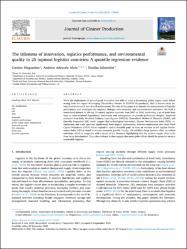The trilemma of innovation, logistics performance, and environmental quality in 25 topmost logistics countries: A quantile regression evidence
Özet
While the deployment of technological innovation was able to avert a devastating global supply chain fallout
arising from the impact of ravaging COronaVIrus Disease 19 (COVID-19) pandemic, little is known about potential environmental cost of such achievement. The aim of this paper is to identify the determinants of logistics
performance and investigate its empirical linkages with economic and environmental indicators. We built a
macro-level dataset for the top 25 ranked logistics countries from 2007 to 2018, conducting a set of panel data
tests on cross-sectional dependence, stationarity and cointegration, to provide preliminary insights. Empirical
estimates from Fully Modified Ordinary Least Squares (FMOLS), Generalized Method of Moments (GMM), and
Quantile Regression (QR) model suggest that technological innovation, Human Development Index (HDI), urbanization, and trade openness significantly boost logistic performance, whereas employment and Gross Fixed
Capital Formation (GFCF) fail to respond in such a desirable path. In turn, an increase in the Logistic Performance Index (LPI) is found to worsen economic growth. Finally, LPI exhibits a large positive effect on carbon
emissions, which is congruent with a strand of the literature highlighting that the modern supply chain is far
from being decarbonized. Thus, this evidence further suggest that more global efforts should be geared to attain a
sustainable logistics.
Cilt
322Bağlantı
https://hdl.handle.net/11363/5230Koleksiyonlar
Aşağıdaki lisans dosyası bu öğe ile ilişkilidir:


















